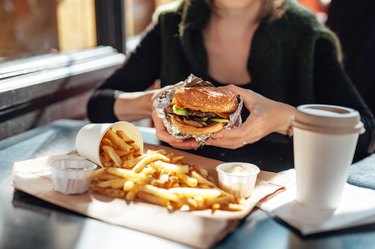
Diarrhea is never a fun condition to go through. It can cause dehydration and make you uncomfortable in social situations or make it impossible to leave the house. If you experience diarrhea after eating certain foods—especially ones high in fat—you may have a stomach or other condition that needs attention.
Irritable Bowel Syndrome
Video of the Day
Irritable bowel syndrome—also known as IBS—is a stomach condition affecting the colon, or large intestine. According to the National Institute of Diabetes and Digestive and Kidney Diseases, eating even moderate amounts of fatty foods, such as fried foods, can exacerbate IBS symptoms, one of which is severe diarrhea.
Video of the Day
Chronic Pancreatitis
Chronic pancreatitis a condition that affects the pancreas, making it difficult for the body to absorb certain types of nutrients, including fat. Patients with chronic pancreatitis may experience oily or fatty diarrhea. Alcohol abuse is a common cause of chronic pancreatitis, affecting the body's ability to absorb the high fat food you just ate.
Other Causes
According to gastroenterologist Frank Jackson, M.D., your stomach and digestive system sometimes experience an abnormal change in function due to a certain type of food or combination of foods, and is not linked to any chronic condition. Eating a high-fat meal before getting on an airplane or eating fatty foods while undergoing significant stress may trigger diarrhea due to the body's reaction to external conditions. High fat foods can also exacerbate existing diarrhea, according to the Pancreatic Cancer Action Network, meaning that if you have the stomach flu or another type of virus, eating fatty foods may contribute to experiencing diarrhea.
Prevention/Solution
Depending on the frequency and seriousness of your diarrhea, you'll likely want to talk to a doctor in order to determine if your symptoms are part of an overall medical condition such as IBS or chronic pancreatitis. Your doctor can help you modify your diet or prescribe medication—such as pancreatic enzymes—to help manage your symptoms. If you notice a pattern of diarrhea with high fat meals, find lower fat alternatives to the foods you eat. For example, you can substitute whole-milk products such as milk, cheese and yogurt with low fat or skim alternatives. Avoid fried foods, red meat and other protein sources high in saturated fat.
Warning
Diarrhea is a common occurrence and by itself is not a serious medical condition. But, when it becomes chronic, it can lead to dehydration and loss of essential electrolytes that help keep your body chemically balanced. If you experience diarrhea for more than three days in a row, talk to your doctor, according to the NIDDK.
- Mayo Clinic: Irritable Bowel Syndrome
- Pancreatic Cancer Action Network: Diarrhea
- National Institute of Diabetes and Digestive and Kidney Diseases: What I Need to Know About Diarrhea
- GI Care: Diarrhea
- National Institute of Diabetes and Digestive and Kidney Diseases: What I Need to Know About Irritable Bowel Syndrome
- American College of Gastroenterology: Diarrheal Diseases
Is this an emergency? If you are experiencing serious medical symptoms, please see the National Library of Medicine’s list of signs you need emergency medical attention or call 911.